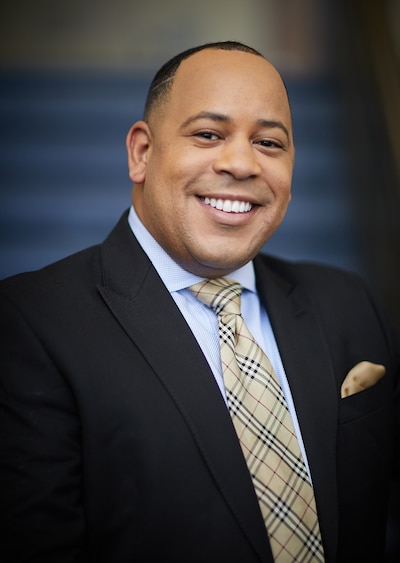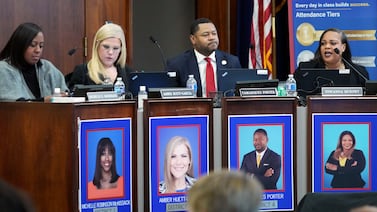Sign up for Chalkbeat Indiana’s free daily newsletter to keep up with Indianapolis Public Schools, Marion County’s township districts, and statewide education news.
Indianapolis Public Schools board members must appoint a new member to serve for the remainder of the year after vice president Kenneth Allen resigned from the school board last week.
Allen was sworn in to fill the vacant constable seat for Center Township on Friday, just days after losing a second term as an at-large member of the school board.
IPS board policy requires remaining board members to fill the vacant seat within 30 days, giving the board until early December to make a decision.
Board president Angelia Moore said they are considering next steps. State law requires that the board fill the vacancy as soon as is practicable.
Constables are officials elected by each township in Indiana to serve legal papers and act as a bailiff for the state’s small claims courts. The Center Township constable’s office had been vacant since former constable Denise Hatch pled guilty to a felony, the IndyStar reported. State law dictates that local members of the previous officeholder’s political party must meet in a caucus to choose a replacement.

Allen did not reply to a request for comment.
In a Facebook post on Saturday, he announced his resignation from the board and his new position.
“Serving our schools and community has been an incredible honor, and I am deeply grateful to the thousands of voters, supporters, volunteers, and donors who worked tirelessly to re-elect me,” Allen said in the post. “Your faith in me has meant the world, and together, we have achieved so much.”
Allen raised over $260,000 in his first bid for school board in 2020 with the help of political action committees associated with charter-friendly groups. In this campaign cycle, however, Allen said he would remain independent of such financial assistance. He was the only incumbent candidate running for re-election, and the three candidate race was the most competitive election for a single school board seat in the county. In his bid for a second term, Allen called for boosting student safety, expanding literacy programs, boosting teacher support, and maintaining community engagement.
The head of Stand for Children Indiana, a group supportive of charters that donates heavily to its endorsed candidates though its PAC, said Allen sought the group’s endorsement but ended his interest after the group chose his opponent Deandra Thompson.
Thompson beat Allen and third opponent Carrie Harris with roughly 56% of the vote, according to unofficial election results. She won with over $90,000 in fundraising efforts, in comparison to the roughly $5,500 Allen raised.
The board could tap Thompson to fill the vacancy for the remaining weeks of Allen’s term, but would not have to, according to Lisa Tanselle, general counsel for the Indiana School Boards Association. Thompson, as well as incoming board members Gayle Cosby and Ashley Thomas, will be sworn on to the board in January.
Amelia Pak-Harvey covers Indianapolis and Lawrence Township schools for Chalkbeat Indiana. Contact Amelia at apak-harvey@chalkbeat.org. Aleksandra Appleton covers Indiana education policy and writes about K-12 schools across the state. Contact her at aappleton@chalkbeat.org.







